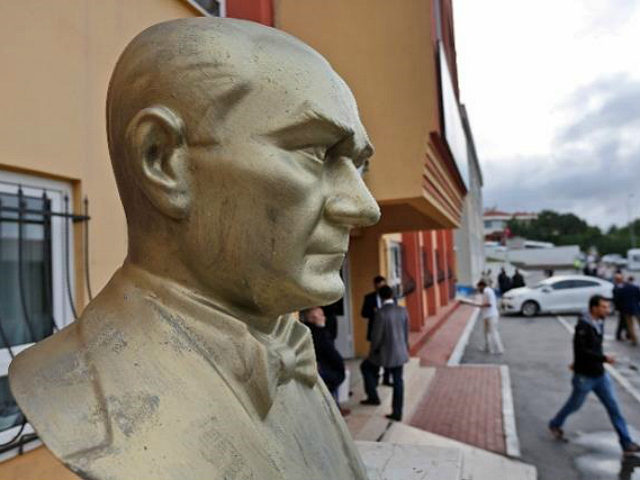Turkish President Recep Tayyip Erdoğan railed on Thursday against the modern Turkish language, lamenting that “unpleasant, dull and soulless words” had entered it when Turkish Republic founder Mustafa Kemal Atatürk ordered reforms to formalize the Ottoman dialects.
Erdoğan insisted that Turkey must return to speaking Ottoman Turkish, which uses Arabic script, rather than the Roman letters currently used by Turks to write their language.
“It is one of the biggest problems in recent history that our language has become a subject of political discussions. In the name of ‘language revolution,’ our Turkish was attacked by unpleasant, dull and soulless words,” he lamented in a speech to high schoolers in Ankara, according to the Turkish newspaper Hurriyet.
“If today younger generations cannot understand Mehmet Akif Ersoy, Ömer Seyfettin or Ahmet Haşimi, let alone Fuzuli or Baki, it is because our language was destroyed during that period,” Erdoğan said, referring to the period in the immediate aftermath of the fall of the Ottoman empire and creation of the Republic of Turkey. The men listed are famous poets and writers of the Ottoman era.
“I believe the period that destroyed the richness of our language is long gone. But I believe the destruction continues. For this reason, I think it would be good that Ottoman Turkish gets taught in schools,” he concluded.
Erdoğan argued that language is key to a coherent cultural identity and that “if you cut the vein of one nation from its language, then you cut their ties with their grandfathers.”
“Our bond with our history was cut,” he argued.
Modern Turkish is a creation of the Turkish Language Society, founded by Atatürk in 1932 to establish uniform language, spelling, and grammar for Turkish using Latin letters. The reforms were taught in schools, meaning most Turks would no longer be able to read nearly one thousand years’ worth of Ottoman texts. Atatürk founded the Republic of Turkey as a secular, pro-Western nation, steering away from the Muslim world in language and the education system while urging integration with Europe.
Erdoğan did not mention Atatürk in his speech, according to the Hurriyet report on his comments.
Insulting Atatürk remains illegal in Turkey today. Law 5816 in the Turkish penal code codifies “insulting Atatürk’s memory” as a criminal offense. The odds of a Turkish prosecutor levying a claim against Erdoğan suggesting that condemning Atatürk’s language reforms insults the founding father’s memory are extremely slim in a nation that saw nearly 5,000 cases go to trial on charges of “insulting the president,” another crime in the Turkish penal code.
Erdoğan, the head of Turkey’s Islamist Justice and Development Party (AKP), has championed a series of reforms meant to erase much of Atatürk’s secular legacy, all while claiming Atatürk himself would have supported his rule. In January, Erdoğan announced a major overhaul of Turkish education to create a “pious generation” of Muslims to “work for the construction of a new civilization,” presumably to replace the Republic of Turkey. He has enacted policies to implement increased Quranic education in schools and force students to spend more time learning Islamic history and faith. Erdoğan also pioneered the establishment of an Islamic university controlled by the government that he claimed would rival al-Azhar University in Egypt, the world’s preeminent Sunni Muslim academic institution. His reforms have been hugely unpopular among secular Turks, who grew up in a secular society and have concerns about their children being indoctrinated with Muslim teachings in school.
The president’s championing of inserting Islam into every aspect of society and rolling back the reforms of the modern Republic of Turkey appear to have triggered some backlash against Atatürk himself. In August 2017, two individuals were arrested in separate incidents of vandalism of statues and busts of Atatürk. In one of those cases, the attacker shouted slogans against “idol worship,” objecting to the presence of a bust of Atatürk in a Muslim country. The use of icons or idols is strictly prohibited in Islam.

COMMENTS
Please let us know if you're having issues with commenting.